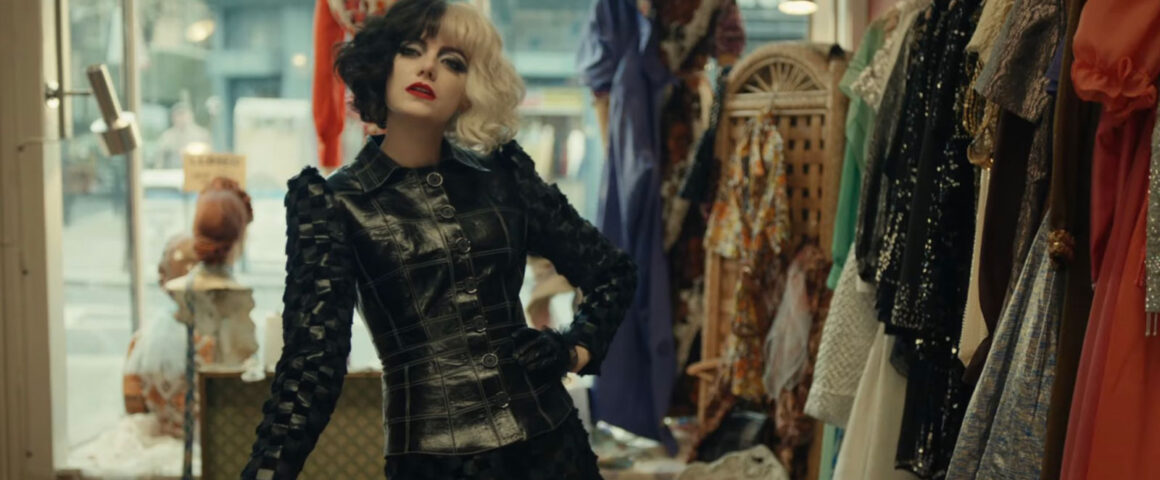While Cruella de Vil is an iconic Disney villain, is there much potential in showing the origin story of a character whose fashion sense leads to her wanting to skin 101 Dalmatians? The answer is a yes as prominent as the eponymous character’s bi-colored hair, as director Craig Gillespie and screenwriters Dana Fox and Tony McNamara, along with a killer cast, deliver a delightfully dynamic and deliciously de Villish dance macabre of duality, identity and fashion, plus bits with dogs.
Much like the director’s previous feature “I, Tonya,” Cruella tells the story of a familiar character but gives her some new twists. The young Cruella (Tipper Seifert-Cleveland, “Emily and the Magical Journey”), or Estella as she starts out, is given a tragic but not overly sentimental backstory. Raised by a loving and supportive mother Catherine (Emily Beecham, “Berlin, I Love You”), Estella is precocious without being annoying and mature without being creepy. Her early school career demonstrates her defiance and encounters with authority, and while she is not without love or compassion, a raw deal leads her to an opportunistic life of crime where dreams give way to pragmatism. As a young adult, Estella’s (Emma Stone, “The Favourite”) burgeoning ambition and ruthlessness are balanced with loyalty and devotion, and it helps that her adversary the Baroness (Emma Thompson, “Last Christmas”) proves to be far worse in the questionable character stakes. The battle of wits between Estella and the Baroness is hugely enjoyable, and develops the film’s interest in identity as Cruella emerges as a weapon for Estella and then steadily takes over the film, without losing the audience’s sympathy.
Emma Stone energizes Estella/Cruella with a magnificent relish, her genius, ambition and charisma crackling around her like an electromagnetic field that both draws and repels those she encounters. In this Battle of the Emmas, Thompson matches Stone for every arched eyebrow and haughty put-down, leaving no scenery unchewed as she withers those around her with supreme superciliousness. Jasper (Joel Fry, “In the Earth”) and Horace (Paul Walter Hauser, “BlacKkKlansman”) are expanded beyond their original roles as bumbling sidekicks, becoming the family that Estella/Cruella lacks. Mark Strong (“1917”) is on reliably solid form as the Baroness’ valet John, and there is great support from the likes of John McCrea (“The Sandman” TV series), Kayvan Novak (“Four Lions”) and Kirby Howell-Baptiste (“A Dog’s Purpose”). There’s also perhaps a surprisingly fond treatment of dogs, who feature as threats, companions and obstacles, with the digital rendering of these animals only briefly distracting.
The film does have its flaws. The story could have been more efficiently told which would have given the film a beneficially shorter running time, whereas at two hours fourteen minutes there are points where it drags. There is a late reveal that is so deus ex machina that it may induce groans of “Really?” from the viewer. Some nods to “101 Dalmatians” feel like nothing more than nods, and a mid-credits sequence might point to the familiar story but frankly another film focused on Cruella herself seems like more fun, due to the delicious designs and Machiavellian machinations on display here.
On the display front, Gillespie and director of photography Nicolas Karakatsanis deliver stunning visuals throughout. A tumble down a slope is intercut with charging dogs; a crane shot follows a trio of intrepid children in and out of an abandoned building; a montage of Estella trying to make suggestions to her boss is both funny and touching; a stellar prolonged single take through the various floors and corridors of a department store truly brings the viewer into Estella’s world.
Getting into this world is important, because appreciating her position helps align the viewer with her schemes and ambition. In this regard, Cruella is an important feminist film because it takes the position that girls don’t have to be sugar and spice and all things nice. The Baroness is a tough adversary, but Cruella is no Cinderella, with little interest in having courage or being kind. Ambition and revenge, and to a lesser extent fame and fortune, are her driving forces. In the context of a crime caper, which interweaves fashion designs with heists and confidence tricks, this is quite standard for male protagonists but still relatively rare for women. Cruella has no romantic interest, and her various associates are drawn into her orbit largely by force of will. As a result, the audience are also drawn in, and particular moments (especially one involving a vault and a delivery from South America) might have the viewer giggling with glee because of the triumph of our antiheroine. Cruella is a thoroughly female protagonist (rather than a woman filling a man’s role), literally decides who she is and what she is going to do. As well as the stylistic flourishes noted earlier, Gillespie wisely reins it in at times: A long take on Cruella’s face as she delivers a monologue expresses a clear and unapologetic acceptance of her lot in life as well as a declaration of identity and her role in the world. Would that all characters of any gender were permitted such authority.
Furthermore, the film continues Disney’s surprisingly progressive identity politics. The supporting cast includes various people of color, who get to be people rather than tokens. More intriguingly, Cruella delivers an inclusive approach to gender fluidity. Estella/Cruella herself indicates that identity is influenced by choice, and McCrea’s character Art is explicitly non-binary. The relationship between Art and Cruella makes Art far more than a cypher, and it makes a sequel (already in preproduction) all the more enticing. The inclusivity of Cruella demonstrates the potential for established intellectual property like this — the audience come for the familiarity, and then we leave with something more.



